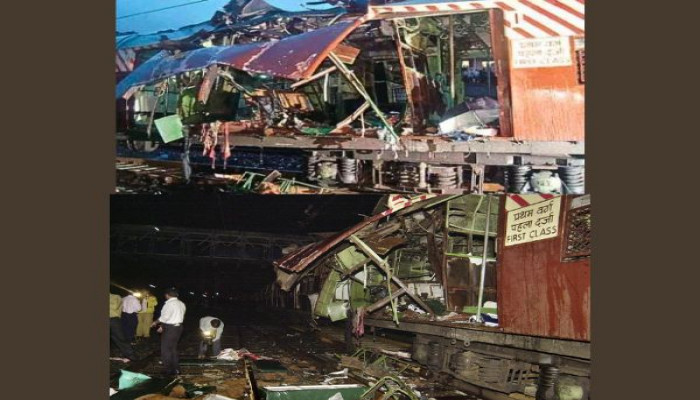Bombay High Court acquits all accused in 2006 Mumbai train bombings, rejects death sentence confirmation
- In Reports
- 05:33 PM, Jul 21, 2025
- Myind Staff
The Bombay High Court on Monday overturned the special court’s decision that had sentenced five individuals to death for their alleged role in the 2006 Mumbai train blasts and also dismissed the Maharashtra Government’s plea seeking confirmation of those sentences. The high court acquitted all twelve accused in the case, including those who had received life imprisonment.
A special bench comprising Justices Anil S Kilor and Shyam C Chandak raised concerns about the reliability of certain prosecution witnesses and the Test Identification Parade carried out for some of the accused. The bench ordered their release if they are not wanted in any other case and directed each of them to furnish a personal bond of Rs 25,000.
Agreeing with the arguments presented by the defence counsel, the bench remarked that the prosecution “failed completely to prove the offences beyond a reasonable doubt against the accused on each charge.”
Justice Kilor, who led the bench, stated, “It is not safe to come to the conclusion that the appellant accused has committed the offence for which they have been convicted and sentenced. Hence, the accused judgment and order of conviction and sentence are prone to be set aside and quashed.”
There were thirteen people charged in the case, one of whom had already been acquitted by the special court under the Maharashtra Control of Organised Crimes Act. Among the remaining twelve, five were sentenced to death, one of whom died in prison during the COVID-19 pandemic, while seven were sentenced to life in prison.
The court delivered the judgment more than five months after concluding hearings on January 31. The Bombay High Court had heard the case over a six-month period starting in July of the previous year.
On July 11, 2006, a series of bomb blasts struck seven coaches of suburban trains in western Mumbai, killing 189 people and injuring 824 others. Following an eight-year-long trial, the special MCOCA court sentenced five of the accused to death and gave life imprisonment to seven others in September 2015.
The death penalties were imposed under charges of terrorism, organised crime, conspiracy and murder based on various laws including the Unlawful Activities Prevention Act, the Explosive Substances Act of 1908, the MCOCA, the Indian Penal Code and the Railways Act of 1989.
The convicts had been lodged in various prisons across Maharashtra, such as Yerawada and Amravati central jails, for over eighteen years. They appealed against their convictions by the special court and the matter had remained pending since then.
The case involved 250 witnesses, including 92 for the prosecution, and the documentary evidence extended to 169 volumes, while the judgments related to the capital sentences ran nearly 2,000 pages.
The five convicts who received the death penalty were Kamal Ahmed Mohd Vakil Ansari from Bihar, Mohammad Faisal Ataur Rahman Shaikh from Mumbai, Ehtesham Qutubuddin Siddique from Thane, Naveed Hussain Khan from Secunderabad and Asif Khan Bashir Khan from Jalgaon in Maharashtra. They were held guilty of planting the explosives.
The seven others sentenced to life imprisonment were Tanveer Ahmed Mohammed Ibrahim Ansari, Mohammed Majid Mohammed Shafi, Shaikh Mohammed Ali Alam Shaikh, Mohammed Sajid Margub Ansari, Muzammil Ataur Rahman Shaikh, Suhail Mehmood Shaikh and Zameer Ahmed Latifur Rehman Shaikh. One more accused, Wahid Shaikh, had earlier been acquitted by the trial court after spending nine years in prison.
In 2015, the Maharashtra Government filed a plea before the Bombay High Court seeking confirmation of the death sentences awarded to five convicts in the 2006 train blast case. The convicted individuals also filed appeals against the special court’s judgment.
As the convicts requested speedy disposal of the case that had been pending since 2015, the High Court formed a special bench in July 2024 under the leadership of Justice Kilor. This bench held more than 75 hearings over a period of six months.
The convicts were represented by former Delhi High Court judge S Muralidhar, along with Senior Advocates Nitya Ramakrishnan and S Nagamuthu and Advocates Yug Mohit Chaudhry and Payoshi Roy. Senior Advocate Raja Thakare, who was appointed as the special public prosecutor, appeared on behalf of the Maharashtra Government.
The defence team argued that the “extra-judicial confessional statements” recorded by the Maharashtra Anti-Terrorism Squad were obtained through “torture” and were inadmissible in law.
They also said that the accused were innocent and had been falsely implicated, having spent 18 years in jail without substantial proof against them, and that their most valuable years were lost. They contended that the trial court made an error in convicting them and that the verdict should be set aside.
In response, the Maharashtra Government opposed the appeals and maintained that the investigating agency had submitted enough evidence to prove that this was a “rarest of the rare” case justifying the death penalty.







Comments